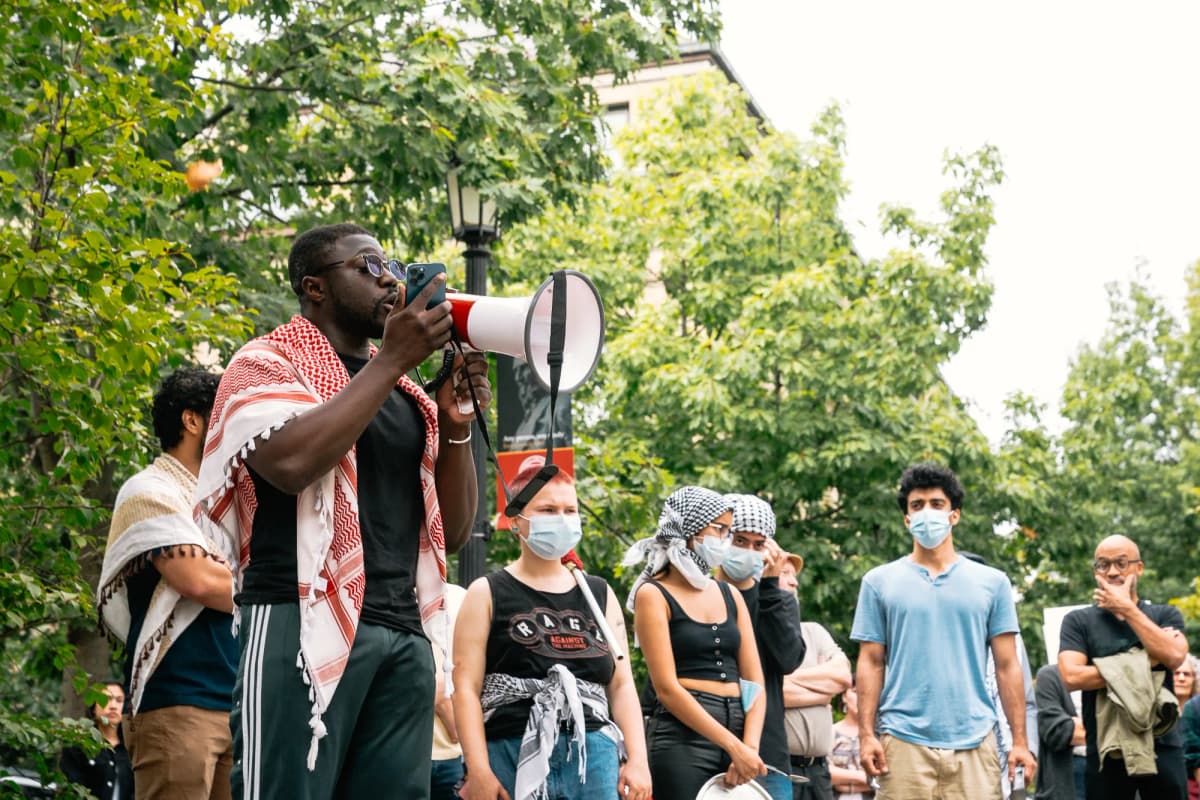Cornell Yanks Student’s Visa, Tells Him Deportation Is Around the Corner, for Role in ‘Menacing’ Anti-Israel Protest
The university said he and his fellow demonstrators were so loud, there were complaints of potential hearing loss.

An international student at Cornell University engaged in such “egregious” and disruptive behavior during an anti-Israel protest that the Ivy League school is yanking his visa, telling him he will “effectively” be “deported by the weekend.”
Momodou Taal, a graduate student from the United Kingdom, was suspended for the second time this year from Cornell after participating in what the university called a “highly disruptive” demonstration at a career fair at the Statler Hotel.
The university’s interim president, Michael Kotlikoff, said in a statement that the institution supports “expressive activity,” even if it “may offend others.” However, it also stresses the “responsibility to respect others.”
“Last Wednesday, members of our community displayed highly disruptive and intentionally menacing behavior in a protest that shut down a career fair at the Statler Hotel,” the statement continued. “The demonstrators forcibly entered the hotel by pushing aside Cornell Police officers. The protesters loudly marched through the hotel lobby and up the stairs, frightening students, staff, and recruiters.”
The demonstrators were calling for divestment from defense contractors that supply arms to Israel, such as Boeing, which was at the fair. The Coalition for Mutual Liberation, which organized the protest, accused Cornell of growing its endowment “through violence” by investing in such companies.
According to Cornell, the protesters “forced their way past additional CUPD officers” at the hotel’s entrance and knocked a body-worn camera off a police officer. The university also said the demonstrators “screamed into bullhorns and banged cymbals, pots and pans, resulting in medical complaints of potential hearing loss. The protesters shouted profanity, disrupted display tables, and alarmed students who had been talking with employers.”
Ithaca.com reported that more than 100 students participated in the protest, which featured drums, pots, and pans outside the hotel. Inside the venue, the outlet reported, the protesters disrupted the event with chants.
Cornell’s statement added, “These intimidating tactics have no place in a university and violate our commitments to each other. Actions have consequences, on campus and in the criminal justice system.”
The university explained students who participated in the protest would face “immediate suspension or employment sanctions up to and including dismissal.”
Mr. Taal shared on Monday that he had been suspended for his participation in the protest. He claimed that the punishment was part of a “campaign of intimidation and harassment.”
“They informed me that I am effectively being deported by the weekend,” he wrote on X.
In an e-mail shared with The Cornell Daily Sun, Christina Liang, the head of the Office of Student Conduct and Community Standards, told Mr. Taal he was reported to the university for his participation in the protest.
The e-mail said he engaged in “escalating, egregious behavior and a disregard for the University policies.” Later that day, he was given an order that prevented him from entering the campus.
During the spring semester, Mr. Taal was suspended after helping to organize a pro-Palestinian encampment on campus. His second suspension now puts his ability to stay in the country at risk if he cannot change his immigration status.
On Tuesday, he shared an e-mail with a senior immigration advisor that said officials are required to close an F-1 visa if a student has been “suspended or discontinued from their academic program.”
“Closure of your F-1 visa record affects the student’s ability to remain or enter the U.S. in F-1 status. There is no grace period for exiting the US. If the student is in the U.S., then they should exit as soon as possible or work with a licensed immigration lawyer to change their immigration status to another appropriate status,” the advisor said.
Cornell provided a statement from Joel Melina, the vice president for University Relations, to The New York Sun, which read, “International students attending college in the U.S. on F-1 visas are obligated to comply with federal requirements to maintain their visa status. These federal requirements include remaining enrolled as a full-time registered student. Universities are required by federal regulation to terminate the F-1 status for any student who is not permitted to be enrolled due to a disciplinary action.”
“Universities can disallow enrollment and bar a student from campus but do not have deportation powers,” Melina added.
Mr. Taal’s suspension and the possibility of him having to leave the country have caused an uproar on campus. As of Tuesday evening, 18 student groups at the university posted messages of solidarity for him, and a petition calling for his reinstatement has received more than 1,000 signatures from students and community members.

